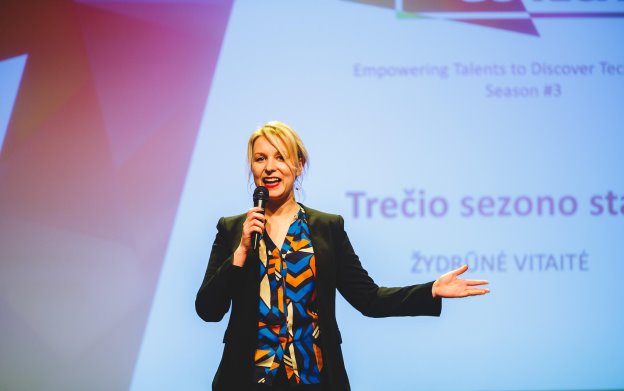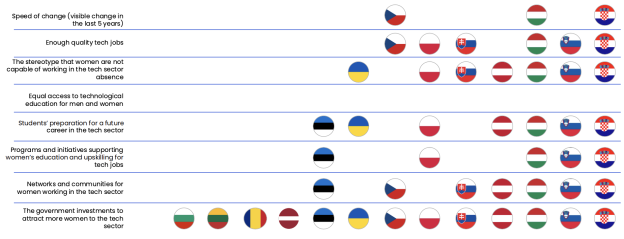Women Go Tech published results from a Google.org and OSCE-backed study on the challenges and disparities facing women at all levels of the tech sector. Over 40 experts and 5,000 women provided insight into how the situation can be improved, mostly through public policy and private development.
February 4, Vilnius–Lithuania. Women Go Tech, a Lithuanian NGO focused on empowering women in tech, recently released a new study highlighting the challenges women in Central and Eastern Europe face during their career progression in the tech industry, and presenting strategies to empower women in tech.
The study, „Building the Future Power Hub for Women in Tech,” surveyed 5,475 women across 13 countries, with support from Google.org and the Organization for Security and Cooperation in Europe (OSCE). The results revealed which countries are most ready to enable women in tech: Bulgaria, Lithuania, Romania, and Latvia. On the other hand, Slovakian, Czech, and Croatian women are experiencing the most barriers to enter the industry.
Country readiness to enable women in tech (Source: Women Go Tech)
“After women shared their experiences, they were analyzed by more than 40 experts, outlining solutions to shift the tech industry landscape to help women succeed faster, in CEE and around the world,” Žydrūnė Vitaitė, co-founder of Women Go Tech, shared.
In the study, respondents from all CEE countries agreed that ageism, negative stereotypes about women’s abilities, and education bias were all factors holding women back or discouraging them from pursuing careers in tech. Women also reported poor work-life balance and low representation in leadership roles as influencing their career decisions, as well as fewer opportunities to learn about tech compared to men.
Specifically in Slovakia, Czechia, Croatia, Slovenia, Hungary, Poland, Austria, Estonia, and Latvia, women also believe it is harder for them to succeed in the tech sector than for men. Croatian and Slovenian women are still facing the strongest stereotypes regarding female incapacity to work in the tech sector.
“Although women in the tech sector today face several challenges, this study also explains where the tech industry can improve and how it can attract more female talent,” noted Žydrūnė. “We need to create a robust environment where women feel supported and empowered not only by the government but also by their peers and other women. A more gender-balanced company will understand and serve the diverse demands of its users and clients, resulting in better products and services. This in turn will help unlock the CEE’s potential to become a global leader in tech innovation.”
Bulgaria, for instance, boasts one of the highest rates of women in tech and science in all of Europe, and respondents in the WGT study recognized opportunities for upskilling as well as equal access to education and jobs. The country’s tech sector grew by 12% in 2023 and has witnessed steady growth over the past 15 years and is one of Europe’s most dynamic tech hubs.
According to a 2023 McKinsey study of 1,265 companies in 23 countries, those companies performing in the top quartile of gender representation had a 39% better chance of financial outperformance versus their peers in the bottom quartile. The same held true for diversity on companies’ boards of directors, with a 27% greater likelihood of outperformance. Moreover, the study concluded that diverse representation will foster diverse talent and innovation.
Governmental input into mentorship programs is needed to close the gap
Main areas for improvement identified in different countries (Source: Women Go Tech)
Better compensation is the primary motivator for women of any age or experience to enter the tech sector, despite the persistence of a pay gap. Work flexibility and work-life balance are also important incentives. Unfortunately, many women working in tech report a lack of these elements in their jobs.
“This discrepancy may be discouraging to women’s willingness to mentor and inspire others to join the industry,” said Vitaitė.
Study revealed that most women surveyed did not have a mentor while progressing through a tech sector.
Survey also revealed that to change the dynamic, policymakers should invest in mentorship and training programs tailored to women. While this is recommended on a governmental level, businesses should also prioritize mentorship programs for women, embrace diverse hiring practices, and work to increase female representation in leadership positions.
An issue that remains in the industry is equal pay, alongside the need to promote transparent equal pay policies. The study encourages hybrid and remote work options in tech. Enabling equal career progression for IT professionals is crucial as Europe faces Information and Communication Technology (ICT) skills shortage–only 12 million specialists are projected by 2030 despite EU’s target of 20 million.
“Building the Future Power Hub for Women in Tech” also included a section focusing on the barriers and biases faced by Ukrainian women in exile who are working to build professional lives within the tech sector.
About Women Go Tech
The organization “Women Go Tech” is an NGO navigating women toward careers in tech. Started as a first mentorship program for women in Lithuania in 2017, it has now expanded activities in the CEE. The organization is committed to educating 20,000 women on the use of AI tools and applications. So far, 700+ women have successfully transitioned into the IT industry with the help of the mentorship program and over 19,000 women participated in the introduction course “Discover Tech”. Having positively impacted the lives of hundreds of women and cultivated a new generation of female role models in tech, the NGO has grown from a local project into a movement with significant influence across the region. The organization is a long-term grantee of Google.org.




COMMENTS